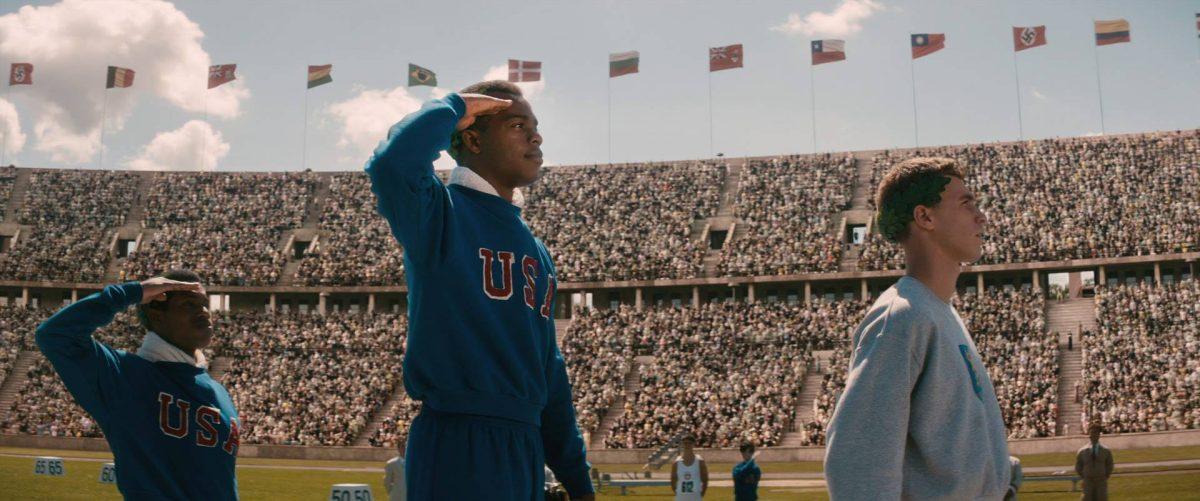facebook.com
“Race,” a film that documents the story of Jesse Owens, achieves new docu-drama heights.
Jesse Owens is a man who knows how to get what he wants. Despite facing incredible odds, the character wins the audience over with his outspoken personality and unlimited drive to achieve his goals. Owens is the fastest man alive, but protests surrounding human rights issues in Nazi Germany threaten to take away his chance to compete in the Olympics. “Race” tells the story of a man who would not let anything get in his way even during a time in history when African Americans were highly discriminated against and meant to be seen but not heard.
The year was 1936. Tensions in a defeated Germany are reaching an all-time high as Chancellor Adolf Hitler prepares the country for war. The world’s best athletes find themselves on the biggest stage in the world competing for a chance to take the gold and the glory back to their home countries. Little does the world know, Hitler and the Nazi party are using the 1936 Summer Olympics in Berlin as a platform for propaganda and as a manipulation tool. The Nazi party attempts to make it seem as though they are an egalitarian nation, using the Olympics to serve as a distraction from the horrible atrocities they were carrying out against the jewish people during that time.
Although Jews faced the harshest discrimination in history during the Nazi regime in Germany, people of color were not all that welcomed in Berlin, host of the summer Olympics. Director Stephen Hopkins does a wonderful job of telling Owen’s captivating story. Hopkins is best known for his earlier films, “Lost in Space” and “Predator 2,” in which he also collaborated with cinematographer Peter Levy. The duo took a break from alien-battling to get in touch with a much more meaningful topic centered around the on-going discussion of inequality.
“Race” has everything one looks for in a biographical picture, while the title takes on a double meaning. The film certainly evokes emotion from the audience, as we all understand that racism is alive as ever, even in our “progressive” society. The character development is strong and is what really makes us root for Owens from start to finish. The lead role is played by Stephan James, a talented 22-year-old hailing from Toronto, Canada. James is also known for his role in “Selma,” the 2014 Oscar-winning film. Clearly, James is no stranger to docudrama style acting.
The other leading role of Owens’ Coach, played by Jason Sudeikis, was a temporary departure from this funny-man’s typical comedic role. Sudeikis, who is known for his part in “Horrible Bosses,” made an impressive transition into a much more serious role in “Race.” The bond built between coach and athlete is a strong one, and the on-screen chemistry between James and Sudeikis is evident in this film.With that said, you don’t have to be a sports fanatic to enjoy this heart-warming success story. There were certain lines throughout the film, however, that were a little bit cheesy and predictable.
Shanice Banton fills the role of Owens’ wife, Ruth Solomon. Their relationship in the film has its ups and downs, but she clearly plays an important role in Owens’ success and as a driving positive force in his life. German-born actor Barnaby Metschurat gives a particularly memorable performance as Joseph Goebbels, one of Hitler’s Nazi associates. It’s hard not to hate his character, who is menacingly creepy, and has the authentic demeanor of one of these sadistic Nazi party officials.
The set design and cinematography are spot-on. This historical film takes you back to this era and confronts the audience with a still very relevant social issue: racism. As shocking as the Holocaust was, the discrimination that African-Americans received at home spotlighted the hypocrisy of America’s stance on Nazi Germany in the pre-war era. the film begs the question, ‘How can America take a critical stance against Germany’s discrimination against Jews competing in the Berlin Olympics, when America felt the same hatred towards people of color?’
The most important take away of the film is the fact that one man could out-perform Hitler’s Aryan idealized competitors, and one mansingle-handedly proved Hitler’s theory wrong. His claim that the white race was superior on all fronts was debunked for the entire world to see.
This did not, however, deter him from his final mission of wiping out all Jews, but Owens’ story helps to highlight the absurdity of Hitler’s delusions.
“Race” is sure to inspire, and movie-goers, sports fans as well ashistory enthusiasts alike will all have an opportunity to be transported to Berlin during those 1936 Summer Olympics and experience this true tale of the triumphs of Owens.



































